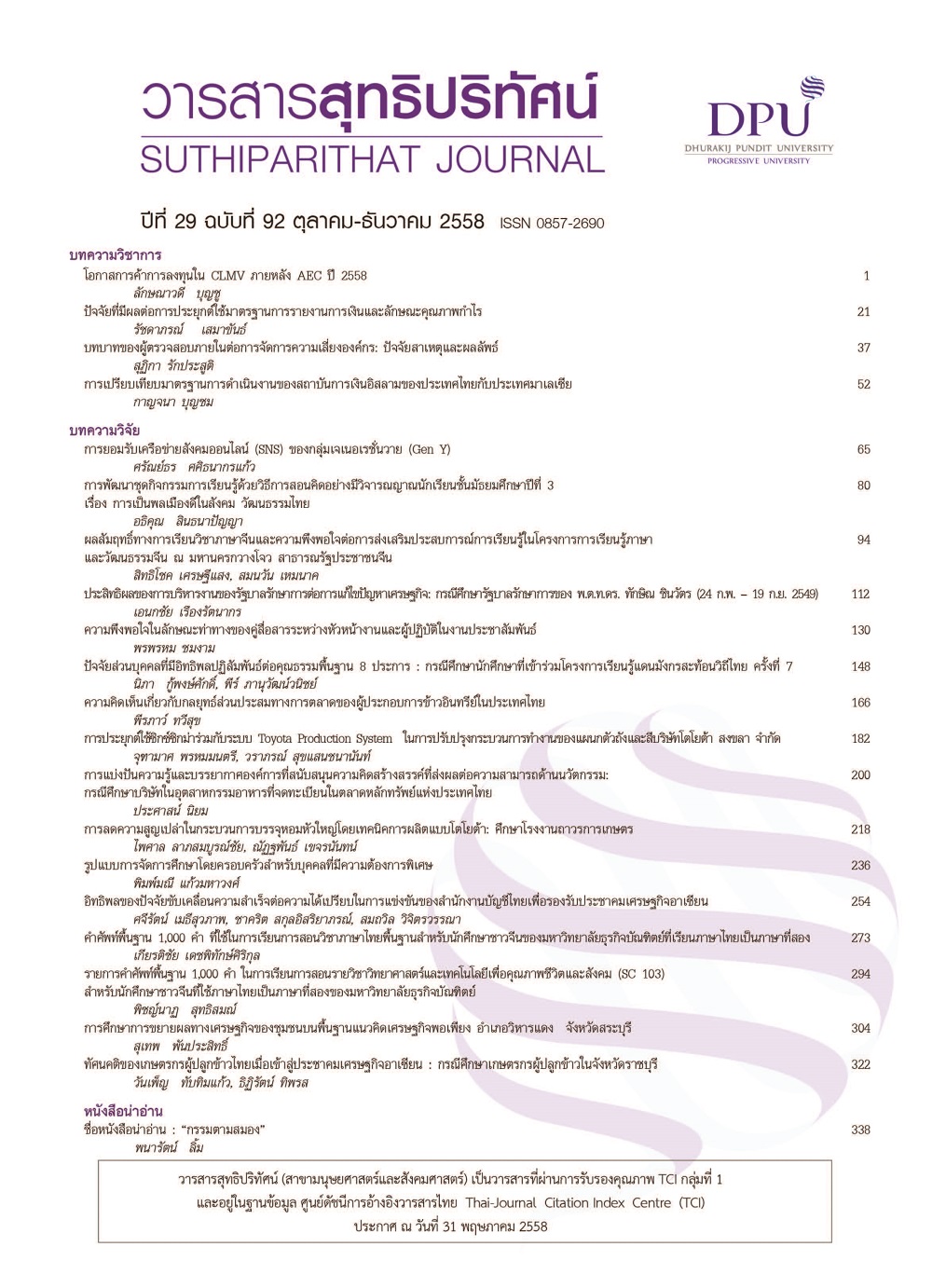การแบ่งปันความรู้และบรรยากาศองค์การที่สนับสนุนความคิดสร้างสรรค์ที่ส่งผลต่อความสามารถด้านนวัตกรรม: กรณีศึกษาบริษัทในอุตสาหกรรมอาหารที่จดทะเบียนในตลาดหลักทรัพย์แห่งประเทศไทย
คำสำคัญ:
การแบ่งปันความรู้, บรรยากาศองค์การที่สนับสนุนความคิดสร้างสรรค์, ความสามารถด้านนวัตกรรมบทคัดย่อ
การวิจัยครั้งนี้มีวัตถุประสงค์ดังนี้ 1) เพื่อศึกษาการแบ่งปันความรู้ของพนักงาน 2) เพื่อศึกษาบรรยากาศองค์การที่สนับสนุนความคิดสร้างสรรค์ 3) เพื่อศึกษาความสามารถด้าน นวัตกรรมและ 4) เพื่อศึกษาการแบ่งปันความรู้และบรรยากาศองค์การที่สนับสนุนความคิดสร้างสรรค์ที่ส่งผลต่อความสามารถด้านนวัตกรรมขององค์การ วิธีดำเนินวิจัยใช้ระเบียบวิธีวิจัยทั้งเชิงปริมาณและเชิงคุณภาพ ประชากรของการวิจัยเชิงปริมาณ ได้แก่ พนักงานขององค์การในอุตสาหกรรมอาหารที่จดทะเบียนในตลาดหลักทรัพย์แห่งประเทศไทย ผู้ให้ข้อมูลสำคัญของการวิจัยเชิงคุณภาพ ได้แก่ ผู้บริหารองค์การที่รับผิดชอบงานเกี่ยวกับนวัตกรรม การวิเคราะห์ข้อมูลเชิง ปริมาณด้วยการวิเคราะห์สหสัมพันธ์ และการวิเคราะห์สมการถดถอยเชิงพหุ การวิเคราะห์ข้อมูล เชิงคุณภาพด้วยการวิเคราะห์เนื้อหา
ผลการศึกษามีดังนี้ การแบ่งปันความรู้ของพนักงานอยู่ในระดับเห็นด้วยมาก บรรยากาศองค์การที่สนับสนุนความคิดสร้างสรรค์อยู่ในระดับเห็นด้วยมาก ความสามารถด้านวัตกรรมอยู่ในระดับปฏิบัติเกือบทุกครั้ง โดยการแบ่งปันความรู้และบรรยากาศองค์การที่สนับสนุนความคิดสร้างสรรค์ส่งผลในทางบวกต่อความสามารถด้านนวัตกรรม ทั้งนี้ผลการวิเคราะห์สมการถดถอย เชิงพหุ พบว่า พฤติกรรมการแบ่งปันความรู้ การสนับสนุนขององค์การและความอิสระส่งผลในทางบวกต่อความสามารถด้านนวัตกรรม
เอกสารอ้างอิง
กัลยา วานิชย์บัญชา. (2544). การวิเคราะห์ตัวแปรหลายตัวแปรด้วยSPSSfor Windows. กรุงเทพฯ: จุฬาลงกรณ์มหาวิทยาลัย.
ตลาดหลักทรัพย์แห่งประเทศไทย. (2556). รายชื่อบริษัท / หลักทรัพย์จดทะเบียน. สืบค้น 3 มกราคม 2556, จาก :http://www.set.or.th.
สำนักงานนวัตกรรมแห่งชาติ. (2550). รายงานผลการสำรวจขีดความสามารถด้านนวัตกรรมของประเทศไทย ปี 2550. กรุงเทพฯ.สำนักงานนวัตกรรมแห่งชาติ กระทรวงวิทยาศาสตร์และเทคโนโลยี
Amabile, T. M. (1997). Motivating creativity in organizations: on doing what you love and loving what you do. California Management Review, 40(1), 39-58.
Behnke, T. M. (2010). Knowledge sharing at work: An examination of organizational antecedents. (Doctor of Business Administration), St. Ambrose University.
Chilton, M. A. , & Bloodgood, J. M. (2010). Adaption-innovation theory and knowledge use in organizations. Management Decision, 48(8), 1159-1180.
Clila Jr., M. J. (2011). Exploring the relationship between organizational citizenship behavior and organizational climates for creativity. (Master of Science), San JosE State University.
Cruz, A. P. (2011). Knowledge Sharing and Competitiveness of Professional Service Firms: A Case Study. (Doctor of Philosophy, Applied Management and Decision Sciences), Walden University.
Gressgard, L. J. (2011). Virtual team collaboration and innovation in organizations. Team Performance Management, 17(1), 102-119.
Inauen, M., & Schenker-Wicki, A. (2011). The impact of outside-in open innovation on innovation performance. European Journal of Innovation Management, 14(4), 496-520.
Kamasak, R., & Bulutlar, F. (2010). The influence of knowledge sharing on innovation. European Business Review, 22(3), 306-317.
Krejcie, R. V. , & Morgan, D. W. . (1970). Determining sample size for research activities. Educational And Psychological Measurement, 30, 607-610.
Kumar, N., & Rose, R. C. (2012). The impact of knowledge sharing and Islamic work ethic on innovation capability. Cross Cultural Management, 19(2), 142-165.
Maria, L. S. V., Celina, G. M., & Jose, A. L. S. (2013). An Assessment of innovativeness in KIBS: Implications on KIBS’ co-creation culture, innovation capability and performance. Journal of Business & Industrial Marketing, 28(2), 1-33.
Moghimi, S., & Subramaniam, I. D. (2013). Employees’ creative behavior: The role of organizational climate in malaysian SMEs. International Journal of Business and Management, 8(5), 1-12.
Nonaka, I., & Konno, N. (1998). The concept of “ba”: Building a foundation for knowledge creation. California Management Review, 40(3), 40-54.
Oh, K. (2014). The Effects of Brand, Design, and Price on Intent to Purchase an Activity Tracker. (Master of Science), College of Education, Florida State University
Rahab, S. & Sudjono. (2011). The Development of Innovation Capability of Small Medium Enterprises Through Knowledge Sharing Process: An Empirical Study Of Indonesian Creative Industry. International Journal of Business and Social Science, 2(21), 112-123.
Reychav, I. , & Weisberg, J. (2010). Bridging intention and behavior of knowledge sharing. Journal of Knowledge Management, 14(2), 285-300.
Rovinelli, R. J., & Hambleton, R. K. (1976). On the Use of Content Specialists in the Assessment of Criterion-Referenced Test Item Validity. Paper presented at the the Annual Meeting of the American Educational Research Association (60th), San Francisco, California, April 19-23, 1976.
Saenz, J., Aramburu, N., & Blanco, C. E. (2012). Knowledge sharing and innovation in Spanish and Colombian high-tech firms. Journal of Knowledge Management, 16(6), 919-933.
Saenz, J., Aramburu, N., & Rivera, O. (2009). Knowledge sharing and innovation performance: A comparison between high-tech and low-tech companies. Journal of Intellectual Capital, 10(1), 22-36.
Samad, S. (2013). Assessing the contribution of human capital on business performance. International Journal of Trade, Economics and Finance, 4(6), 393-397.
Tubbs, S. L., & Jablokow, K. (2009). Leadership development and adaption-innovation theory. The Business Review, Cambridge, 13(1), 53-59.
Wu, C. S., Lee, C. J., & Tsai, L.F. (2012). Influence of creativity and knowledge sharing on performance. Journal of Technology Management in China, 7(1), 64-77
ดาวน์โหลด
เผยแพร่แล้ว
รูปแบบการอ้างอิง
ฉบับ
ประเภทบทความ
สัญญาอนุญาต
เนื้อหาและข้อมูลในบทความที่ลงตีพิมพ์ในวารสารสุทธิปริทัศน์ ถือเป็นข้อคิดเห็นและความรับผิดชอบของผู้เขียนบทความโดยตรงซึ่งกองบรรณาธิการวารสาร ไม่จำเป็นต้องเห็นด้วย หรือร่วมรับผิดชอบใด ๆ
บทความ ข้อมูล เนื้อหา รูปภาพ ฯลฯ ที่ได้รับการตีพิมพ์ในวารสารสุทธิปริทัศน์ ถือเป็นลิขสิทธิ์ของวารสารสุทธิปริทัศน์หากบุคคลหรือหน่วยงานใดต้องการนำทั้งหมดหรือส่วนหนึ่งส่วนใดไปเผยแพร่ต่อหรือเพื่อกระทำการใด ๆ จะต้องได้รับอนุญาตเป็นลายลักษณ์อักษรจากวารสารสุทธิปริทัศน์ก่อนเท่านั้น







